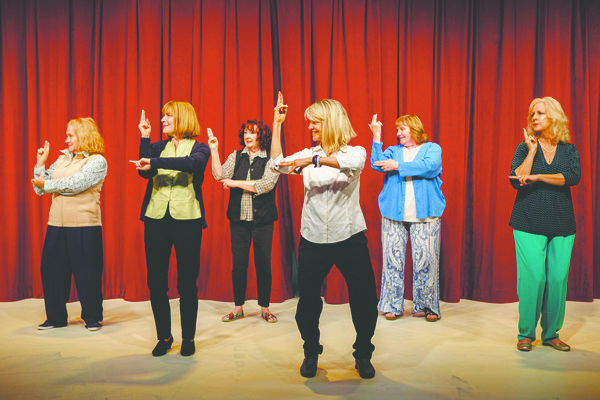Opinion: Netflix’s ‘Tall Girl’ is problematic
Netflix — the popular television and movie streaming super-giant — recently released the original film “Tall Girl.” This movie features teenage Jodi Kreyman (played by Ava Michelle) who struggles her way through high school due to being over six feet tall.
The movie outlines all of the ways that Jodi is constantly being reminded of how much she stands out and how different she feels from other girls her age. Her older sister Harper (played by Sabrina Carpenter) is a blonde bombshell pageant competitor, which only makes Jodi feel more insecure. Constantly at school, her conventionally attractive classmates, who are also of course of average height, are constantly bullying her. One day, a male foreign exchange student, Stig (Luke Eisner), who is taller than Jodi shows up at school. It immediately becomes her mission to try and catch his attention. She goes to her older sister, who helps give Jodi a more feminine makeover.
As a 6’1 girl myself who was also bullied throughout school for how tall I was, I was really excited for this movie. Netflix advertised it with previews that showed off quotes that were too relatable for me. I related to Jodi’s struggle of being unable to find clothes that were flattering on her tall frame and many other scenes, such as being afraid to wear heels. So much of the movie was so validating for me in realizing that other girls feel the same way I have felt throughout my life — and yet, I still found so many problems with it.
The first thing about the movie that bothered me was the way that Jodi was encouraged to attract attention from Stig — by becoming more conventionally attractive. She puts on makeup, wears more feminine clothing, and gets her hair done. Fortunately, the “transformation” scene didn’t reveal Jodi to be radically different than her authentic self. However, as a movie geared towards a younger audience, I found this message to be misleading. Nobody should feel that they have to change themselves to try and impress somebody — whether it be romantically or platonically. This moment in the movie perpetuates that constant, stereotypical narrative where girls must look a certain way to be worthy of male attention. To young girls that are constantly being fed this by movies and film alike, it reminds them every day that they are not good enough to be loved just by being themselves — they have to dress up in a pretty package, too.
While this and other small aspects of the film — such as Stig cheating on his girlfriend and not telling her — were bothersome about the movie, the biggest problem of “Tall Girl,” in my opinion, was who Netflix decided to portray as being marginalized.
Tall, white women are not the most oppressed group in society by far. Height is what enables normal women to be models, and being white lends people a great deal of privilege. Jodi was also, in the movie, slender and healthy, with no serious illness she was coping with. She came from an upper-middle class family, and she had a group of friends to defend her from bullies. Also, the fact that Jodi was a white woman in Louisiana — where the minority community is predominantly black — including her best friend, makes the choice made by Netflix all the more offensive to oppressed people.
If Netflix wanted to create something truly deep and impactful to a young, female audience, they could have featured a plus-sized, teenage girl overcoming obstacles, and not making her weight the theme of the movie. They could have made a movie about a Trans girl getting bullied for her appearance and finding love. A movie about a Latinx girl becoming a first-generation college student. Even making Jodi overweight, Black, or struggling with a mental illness would have made this movie impactful. Choosing a topic that could advocate for somebody with serious obstacles brought on by their societal oppression — not one such as not being able to wear high heels — would have made this movie powerful.
This movie was amazing for me, and I loved that it brought a voice to so many feelings that I’ve experienced throughout my life, and the struggles that I’ve faced being over six feet tall. But I am not the person who needs this type of representation. I want real minorities to be able to experience that feeling of validation that this movie brought me.


